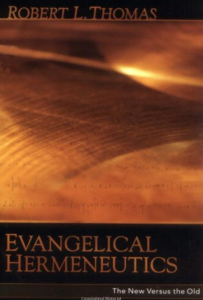
Author: Thomas, R.L.
Genre: Hermeneutics, Theology - Apologetics, Theology - Dispensationalism
Tags:
Series:
Rick Shrader‘s Review:
R.L. Thomas wrote this interesting book in 2002 as Professor of New Testament at The Master’s Seminary. He is best known for his massive commentary on Revelation (in two volumes). This book was written as progressive dispensationalism was getting started (within the last 10 years) and Thomas responds primarily to its hermeneutical issues. Thomas would be considered a traditional dispensationalist and objects to the progressive approach of complementary hermeneutics, sensus plenior, and especially to what he calls “preunderstanding” of the interpretive process, i.e., of bringing one’s preconceived ideas and thoughts into the text prior to the hard work of grammatical-historical interpretation. He also responds to the progressive’s approach they call grammatical-historical-literary-theological interpretation. By adding “literary” to the standard description they open the door to various non-literal approaches. Thomas also warns of too much use of the word “genre” (he calls “genre override”) which itself can become an open door to non-literary devices. Thomas has also been known for his view of handling the OT quotations in the NT. He calls his approach ISPA, or “Inspired Sensus Plenior Application.” By this he means that a NT writer is inspired and therefore can, under inspiration, add fuller meaning (sensus plenior) to an OT quotation and then apply it the way the Spirit wants. This, Thomas insists, never changes the authorial intention of the OT writer. I think the use of the term “sensus plenior” is unfortunate, but I can see what he means. This is a good overview of more recent hermeneutical trends. Thomas is always a solid writer.
